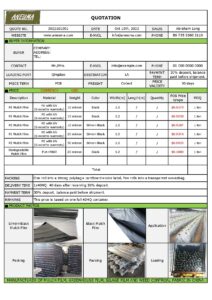Organic farming has gained significant popularity in recent years due to its sustainable and environmentally friendly practices. One essential technique that plays a vital role in organic agriculture is the use of mulch films. Mulch films have revolutionized the way farmers manage their crops, providing numerous benefits that contribute to increased yields, soil health, and water conservation. In this article, we will explore the role of mulch film in organic farming, its benefits, and how it aligns with the principles of organic agriculture.
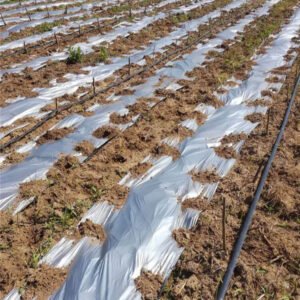
What is Mulch Film?
Mulch film is a thin, plastic covering placed over the soil surface to create a protective layer around plants. It can be made from various materials, including polyethylene, biodegradable polymers, or compostable materials like starch-based plastics. The primary purpose of mulch film is to conserve soil moisture, regulate soil temperature, suppress weed growth, and protect crops from pests and diseases.
Types of Mulch Film Used in Organic Farming
- Biodegradable Mulch Film: Biodegradable mulch films are designed to break down naturally over time. They are made from organic materials that decompose into the soil, eliminating the need for physical removal after use. These films are preferred in organic farming as they do not contribute to plastic pollution and improve soil health.
- Reflective Mulch Film: Reflective mulch films are typically silver or metallic-colored and reflect light back onto the plants. This helps enhance photosynthesis and improve plant growth, making them beneficial for certain crops in organic farming.
- Black Mulch Film: Black mulch films help in weed suppression by blocking sunlight from reaching the soil, inhibiting weed germination and growth. They also warm the soil, promoting earlier planting and improved root growth for heat-loving crops.
- Clear Mulch Film: Clear mulch films warm the soil more quickly than other types, making them suitable for early-season planting. They also promote weed growth, making them more suitable for specific applications in organic farming.
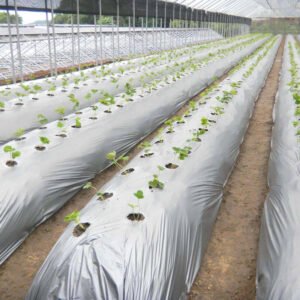
Benefits of Mulch Film in Organic Farming
- Conserves Soil Moisture: One of the most significant advantages of using mulch film is its ability to conserve soil moisture. The film prevents water evaporation from the soil surface, ensuring that the plants have a steady supply of water even during hot and dry periods. This water-saving feature is crucial for sustainable agriculture, particularly in regions prone to droughts.
- Controls Soil Temperature: Mulch films help regulate soil temperature by insulating the soil from extreme heat and cold. This is especially beneficial for temperature-sensitive crops, as it creates a more stable and favorable environment for their growth.
- Weed Suppression: Organic farmers often face challenges with weed control, as synthetic herbicides are not used. Mulch film acts as a physical barrier that prevents weeds from accessing sunlight, impeding their growth and reducing competition with crops. This leads to reduced labor and time required for manual weed control.
- Improved Soil Structure: Over time, organic mulch films break down and contribute organic matter to the soil. This organic matter enhances soil structure, promotes beneficial microbial activity, and increases nutrient retention capacity. Improved soil structure also aids in better water infiltration and root development.
- Pest and Disease Management: Mulch films create a protective barrier that helps deter certain pests and diseases from reaching the plants. Additionally, some mulch films, such as reflective ones, can confuse and repel insects with their shiny surfaces.
- Higher Crop Yields: The combined effects of improved water retention, controlled soil temperature, weed suppression, and pest management result in higher crop yields. Organic farmers can achieve better productivity and profitability by utilizing mulch film appropriately.
- Extended Growing Seasons: With the ability to regulate soil temperature, organic mulch films enable farmers to extend the growing season. They can start planting earlier in the spring and continue cultivation later into the fall, providing an opportunity to grow multiple crops in a single season.
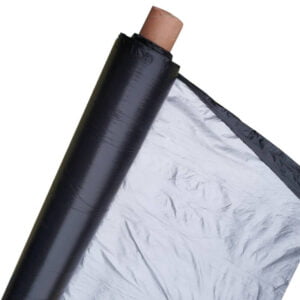
Implementing Mulch Film in Organic Farming
When incorporating mulch film in organic farming, several best practices should be followed to ensure maximum effectiveness while maintaining organic principles:
- Material Selection: Choose biodegradable mulch films made from organic materials like cornstarch, polylactic acid (PLA), or other compostable polymers. These films break down naturally over time, avoiding the environmental issues associated with traditional plastic mulches.
- Soil Preparation: Before laying the mulch film, ensure proper soil preparation. Remove existing weeds and debris to create a clean planting bed. It’s also essential to add organic compost or well-rotted manure to improve soil fertility and structure.
- Irrigation: Mulch films work best when used in conjunction with an efficient irrigation system, such as drip irrigation. This allows water to reach the plant roots directly and prevents excessive water loss due to evaporation.
- Mulch Application: Lay the mulch film carefully over the prepared soil surface, making sure it covers the entire planting area. Secure the edges of the film with soil or stones to prevent it from being blown away by wind.
- Crop Rotation: Practicing crop rotation is crucial in organic farming to maintain soil health and reduce pest and disease pressure. Mulch films can be used for different crops in rotation, enhancing their benefits across various planting seasons.
- Monitoring and Removal: Regularly monitor the condition of the mulch film. If using biodegradable mulch, check its decomposition progress. Remove and dispose of non-biodegradable mulch films responsibly after use to prevent environmental pollution.
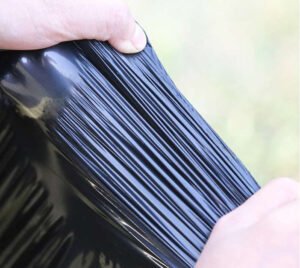
Conclusion
Mulch film plays a pivotal role in organic farming by offering multiple benefits that align with the principles of sustainability, soil health, and reduced environmental impact. From conserving soil moisture to weed suppression and pest management, mulch films enhance crop yields and provide a viable alternative to synthetic agrochemicals.
When implementing mulch film in organic farming, it’s essential to choose biodegradable options and follow best practices to maintain soil fertility and environmental stewardship. By harnessing the advantages of mulch films, organic farmers can improve their agricultural practices, contribute to a healthier planet, and meet the increasing demand for sustainable food production.

